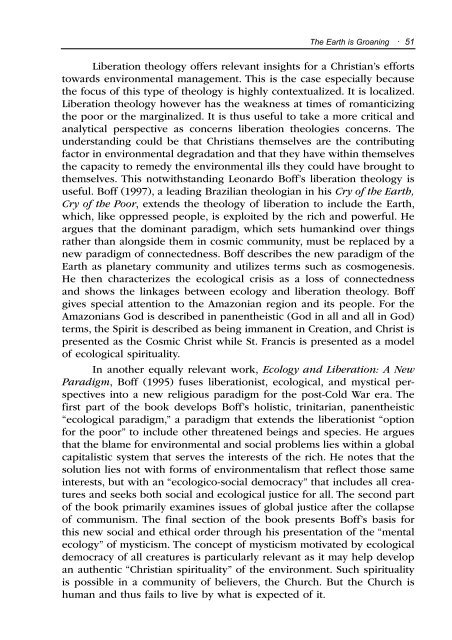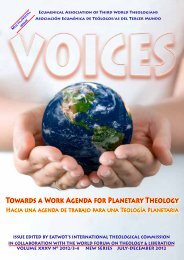voices-2013-2&3 - EATWOT's International Theological Commission
voices-2013-2&3 - EATWOT's International Theological Commission
voices-2013-2&3 - EATWOT's International Theological Commission
Create successful ePaper yourself
Turn your PDF publications into a flip-book with our unique Google optimized e-Paper software.
The Earth is Groaning · 51Liberation theology offers relevant insights for a Christian’s effortstowards environmental management. This is the case especially becausethe focus of this type of theology is highly contextualized. It is localized.Liberation theology however has the weakness at times of romanticizingthe poor or the marginalized. It is thus useful to take a more critical andanalytical perspective as concerns liberation theologies concerns. Theunderstanding could be that Christians themselves are the contributingfactor in environmental degradation and that they have within themselvesthe capacity to remedy the environmental ills they could have brought tothemselves. This notwithstanding Leonardo Boff’s liberation theology isuseful. Boff (1997), a leading Brazilian theologian in his Cry of the Earth,Cry of the Poor, extends the theology of liberation to include the Earth,which, like oppressed people, is exploited by the rich and powerful. Heargues that the dominant paradigm, which sets humankind over thingsrather than alongside them in cosmic community, must be replaced by anew paradigm of connectedness. Boff describes the new paradigm of theEarth as planetary community and utilizes terms such as cosmogenesis.He then characterizes the ecological crisis as a loss of connectednessand shows the linkages between ecology and liberation theology. Boffgives special attention to the Amazonian region and its people. For theAmazonians God is described in panentheistic (God in all and all in God)terms, the Spirit is described as being immanent in Creation, and Christ ispresented as the Cosmic Christ while St. Francis is presented as a modelof ecological spirituality.In another equally relevant work, Ecology and Liberation: A NewParadigm, Boff (1995) fuses liberationist, ecological, and mystical perspectivesinto a new religious paradigm for the post-Cold War era. Thefirst part of the book develops Boff’s holistic, trinitarian, panentheistic“ecological paradigm,” a paradigm that extends the liberationist “optionfor the poor” to include other threatened beings and species. He arguesthat the blame for environmental and social problems lies within a globalcapitalistic system that serves the interests of the rich. He notes that thesolution lies not with forms of environmentalism that reflect those sameinterests, but with an “ecologico-social democracy” that includes all creaturesand seeks both social and ecological justice for all. The second partof the book primarily examines issues of global justice after the collapseof communism. The final section of the book presents Boff’s basis forthis new social and ethical order through his presentation of the “mentalecology” of mysticism. The concept of mysticism motivated by ecologicaldemocracy of all creatures is particularly relevant as it may help developan authentic “Christian spirituality” of the environment. Such spiritualityis possible in a community of believers, the Church. But the Church ishuman and thus fails to live by what is expected of it.





